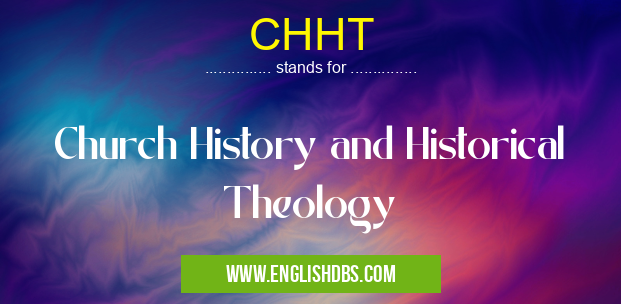What does CHHT mean in HISTORY
Church History and Historical Theology (CHHT) is an academic field of study that focuses on the history of the development and evolution of religious faith and practice. It explores the history of Christianity from its beginnings in antiquity to the present day, as well as other aspects such as belief systems, legal traditions, ecclesial structures, religious movements and social trends. CHHT seeks to provide a comprehensive view of the changes in Christian thought over time and across geographical distances. By analyzing primary sources such as Scripture, Works by Church Fathers, Patristic Theologians, Liturgical Writings and more in combination with secondary sources such as encyclopedias and contemporary studies, CHHT provides a wide range of perspectives on religion throughout history.

CHHT meaning in History in Community
CHHT mostly used in an acronym History in Category Community that means Church History and Historical Theology
Shorthand: CHHT,
Full Form: Church History and Historical Theology
For more information of "Church History and Historical Theology", see the section below.
Definition
Church History and Historical Theology (CHHT) is defined as a field which focuses on examining religious practices throughout history from both theological/philosophical perspective and historical approach. It looks at how doctrines have evolved over time, various denominations that emerged after certain reformations or splits within Christianity, socio-cultural impact on church movements etc. CHHT also considers important figures such as Church Fathers who laid down foundational principles for future generations to follow. Additionally it strives to provide interpretive context for ancient texts that are often used by Christian believers today.
Significance
The importance of understanding Church History and Historical Theology is immense because it allows us to better understand the present-day spiritual climate in which we live. In particular, CHHT helps us gain insight into how different events may shape our beliefs or perception about religion in general or specific denominations over time. Additionally, this knowledge can be beneficial when approaching discussions on faith with people from various backgrounds without compromising own beliefs or others’ perspectives while remaining respectful towards all parties involved. Finally, by studying Church History one will also find valuable lessons that can be applied to current times such as learning from mistakes made by past generations or looking at ways traditions can be preserved while still allowing for change within society’s norms.
Essential Questions and Answers on Church History and Historical Theology in "COMMUNITY»HISTORY"
What is Church History and Historical Theology?
Church History and Historical Theology describes the development of Christian beliefs, practices, and culture over time. It examines the various expressions of Christianity that have existed throughout history, including denominations, creeds, sacraments, and other forms of theological understanding.
How does Church History and Historical Theology differ from Systematic Theology?
Systematic theology attempts to understand a particular set of beliefs from a contemporary perspective; whereas Church History and Historical Theology looks at how those beliefs developed over time.
Is it important to study Church History and Historical Theology?
Yes! Studying Church History and Historical Theology provides insight into the development of the Christian faith throughout history. It also encourages thoughtful reflection on enduring theological ideas relating to God, faith, morality, missional work, etc.
Who should study Church History and Historical Theology?
Everyone can benefit from studying Church History and Historical theology - pastors/clergymen/women who are responsible for teaching their congregation about core Christian beliefs; teachers looking to teach a course on this subject; and even everyday Christians interested in better understanding their own faith in an evangelical sense.
What topics are covered in Church History and Historical Theology?
Topics covered vary depending on the course or program in which one studies; however some common topics include Early Christianity/Christianity in Ancient Rome; Reformation-era Reformers; Ecclesiology (the Study of the Church); Ecumenism (Unity Across Denominations); Biblical Exegesis (Interpretation); Sacraments & Rites; Social & Cultural Contexts for Christianity; Missions & Denominations throughout the World; Modern Trends within the Church & More.
Are there any specialties within this field?
Yes! Specializations may be done in areas such as Comparative Religions (traveling to different parts of the world), Missions & Evangelism (learning how missionaries have spread Christianity around the world) or Denominational Studies (understanding the history of various denominations).
What are some primary sources used for research when studying CHHT?
Primary sources often used when studying CHHT include ancient texts such as scripture/scriptural commentaries written by early church fathers or reformers; church records dating back many centuries which provide insights into contemporary social or political contexts associated with different Christian communities worldwide; eye witness accounts from missionaries or other travelers who have shared experiences about different cultures around the world which shaped their religious identity/experience. Additionally, many scholars use literature written by theologians from past eras who sought to interpret scripture within their own context as well as later authors who interpret scripture according to modern standards.
What types of methods are typically employed when researching CHHT?
Common methodological approaches used when researching CHHT include historical-critical methodologies such as source criticism (examining authenticity vs reliability of sources), form criticism (distinguishing between original meaning vs added interpretation), redaction criticism (studying changes between multiple versions of same text) as well as newer approaches like postmodern literary critiques which seek to uncover underlying symbolic motifs hidden within texts.
Final Words:
To conclude, Church History and Historical Theology (CHHT) is an academic field of study with much significance for any person interested in deepening their knowledge about Christianity through both theological/philosophical study as well as historical research. Through this type of academic work one can come out with a broader understanding of faith practices throughout centuries along with exploring key figures who had much influence in forming them or even inspire us when faced with current dilemmas impacting our daily life choices regarding our relationship with God.
